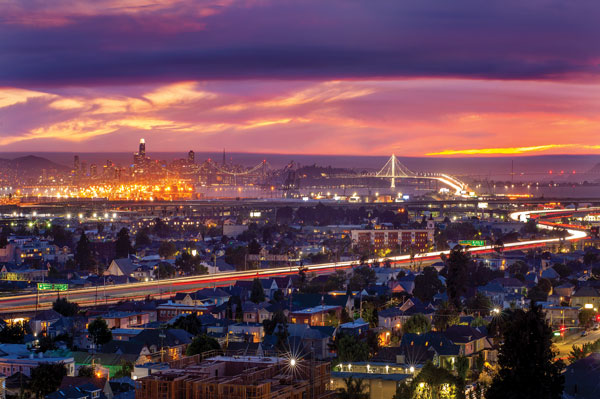Triangulation was a thing even before University of Southern California basketball coach Sam Barry and his player-turned-coach Tex Winter popularized the triangle offense. The practice — which, strictly defined, involves dividing an area into triangles in order to measure or map it — works for data sets too.
In recent years Site Selection has showcased the findings of Startup Genome’s annual ranking of top global startup ecosystems. This year, aided by the data analysis of Site Selection Director of Programming & Analytics Daniel Boyer, we have created a simple but robust mashup based on a composite of Startup Genome’s findings and two other sources: the StartupBlink Index 2024 and the VC Ecosystem Rankings from PitchBook.
Without further ado, here are the top 30 in that composite picture:
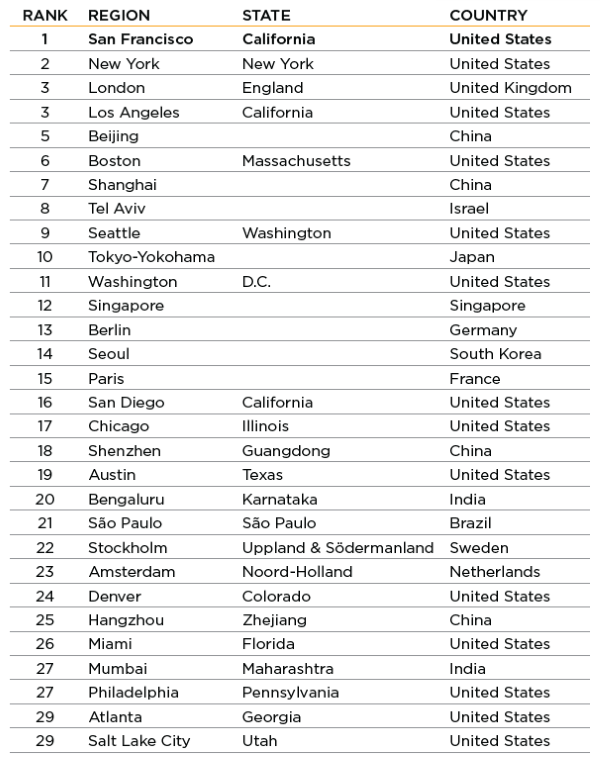
StartupBlink, based in Zurich, Switzerland, calls itself “the world’s most comprehensive startup ecosystem map and research center,” with a map tracking “tens of thousands of registered startups, coworking spaces and accelerators, creating a robust sample of innovation worldwide.” Among the organization’s endorsements is this one involving site selection from Richard Sams, CEO of London-based MOHARA, the global startup studio organization with offices also in in Cape Town, Bangkok, Manila, Guadalajara and Toronto: “I am actually using StartupBlink data as the basis of our expansion strategy into the U.S. I say it’s central to our growth decisions.”
Each year the firm publishes the Global Startup Ecosystem Index Report, ranking ecosystems using more than 40 parameters. The organization’s global map of all 147,326 startups allows you to zoom in and out to see the numbers of startups thriving across the report’s universe of 100 countries and 1,000 cities. The magnification gradations are fine enough that you can ascertain clustering patterns at various megaregional and sub-regional levels — i.e. the U.S. Northeast, the Bay Area, the more than 10,000 startups in and around London, etc. — while also seeing how smaller communities outside the major startup hubs are contributing to the whole.
The StartupBlink rankings of the 1,000 cities include their home countries, but not their states. I examined just the top 100 and found that 34 of them were U.S. metros. California led the way with five of those, the top three of which make our composite ranking: San Francisco (1), Los Angeles (4), San Diego (22), Santa Barbara (88) and Sacramento (92).
After our rankings were prepared, both StartupBlink and Startup Genome issued fresh rankings just at press deadline time for this issue, with Tel Aviv and Paris exchanging positions in StartupBlink’s ranking but nothing else changing much in the top 10 except for the Bay Area increasing its score. However, that top ranking could be in peril if a LinkedIn post from StartupBlink CEO Eli David Rokah after a week in Silicon Valley is to be trusted.
The positives? “This place is a flywheel,” he wrote. “Everyone who is building on scale is here with impressive campuses of innovation.” And an open mentality lends itself to making connections. The negatives? “The number of people in downtown San Francisco with drug or mental health issues is overwhelming,” he wrote. “There is a clear failure in providing those individuals a path to a better life or ensuring the safety of residents who live in this reality daily. This situation is unsustainable and will have consequences for the startup ecosystem.” Moreover, he continued, the sense of connection risks being broken by a “frankly, horrible” public transportation system.
The bottom line, he wrote, is that the Bay Area “risks accommodating only the ultra-rich and those on the fringes of society who can ignore the current system. The middle class might realize that the value of services and safety they receive compared to the cost they pay is irrational … Silicon Valley remains the best startup ecosystem globally. However, many ecosystems globally are doing their best to replace or offset its dominance. If you are already winning massively, what’s the point of helping them? New York is waiting patiently.”
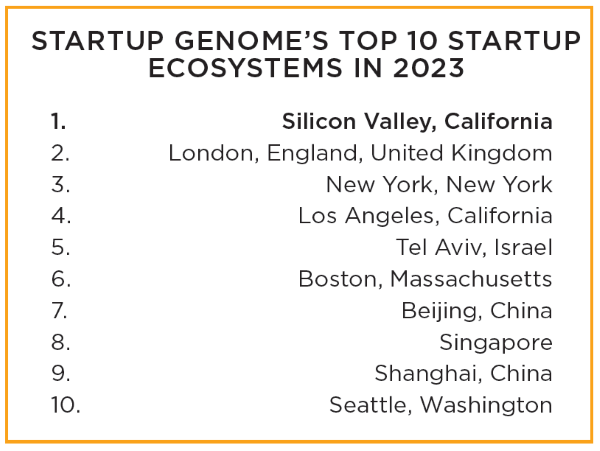
Startup Genome’s fresh findings (again, updated from the rankings performed for the composite chart above) include Silicon Valley still at the top, followed by a tie for second between New York and London. More findings:
- Seoul moved up three spots to No. 9, and Tokyo has entered the global Top 10 for the first time, marking the most significant improvement among the Top 10 ecosystems.
- “Europe is the most represented region in the Emerging Ecosystems Ranking, with a 42% share in the Top 100 Emerging Ecosystems, followed by North America with 27%.” That includes Madrid’s jump up by 12 positions, making it the No. 1 Emerging Ecosystem. Meanwhile, the Greater Lausanne Region, home to IMD and a top-ranked smart city (see Smart Cities, p. 56) moved up 16 positions, reaching No. 11 in the Emerging Ecosystems Ranking.
- “Mexico City has shown impressive growth, reaching the 21-30 range in the Emerging Ecosystems Ranking from the 41-50 range in 2023.”
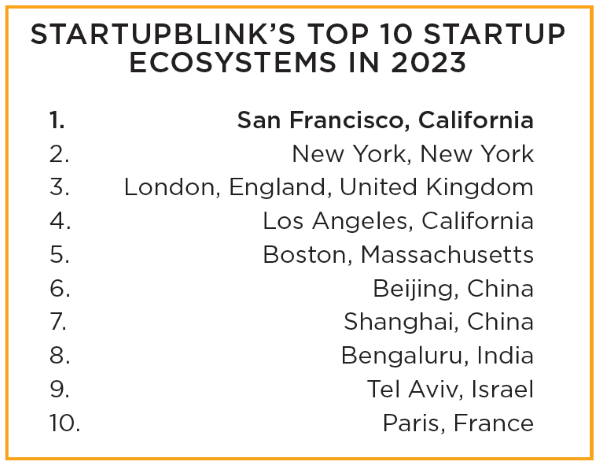
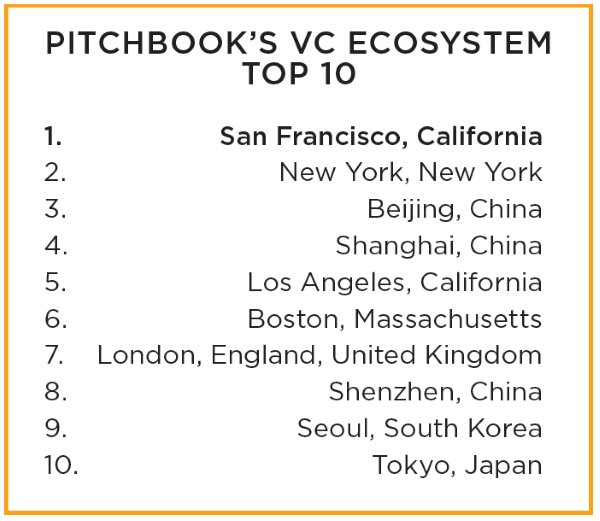
PitchBook’s VC Ecosystem Rankings compare global cities based on the size and maturity of their startup networks. “The list is based on a scoring system that uses PitchBook’s proprietary data on private companies,” Pitchbook says. “Development and growth scores are based on data related to deals, exits fundraising and other factors from the last six years.” The rankings score cities based on the size, maturity and growth rates of their VC hubs to help stakeholders identify areas of interest.
San Francisco remains in the pole position, Pitchbook found. An analyst note remarked, “While 65% of the hubs with the highest growth rates are in Europe, only one European city landed among the top 20 most developed VC ecosystems.” Meanwhile, Dubai is No. 1 by rate of growth.
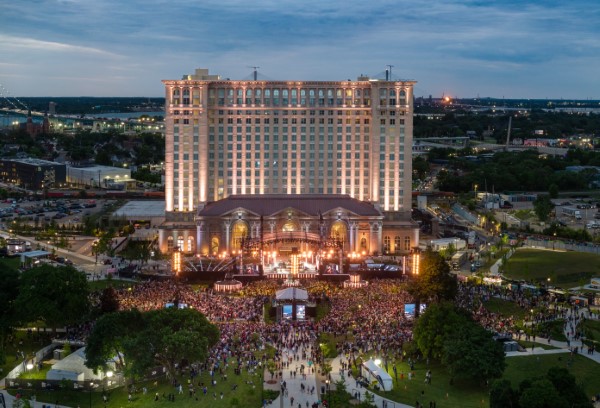 Ford’s completion of a six-year restoration of Michigan Central Station as “the centerpiece of the Michigan Central technology and cultural hub located at the gateway between the historic Corktown and Southwest Detroit neighborhoods,” symbolizes Detroit’s emergence as a “next-generation” startup hub in a place with generations of innovation to its credit already.
Ford’s completion of a six-year restoration of Michigan Central Station as “the centerpiece of the Michigan Central technology and cultural hub located at the gateway between the historic Corktown and Southwest Detroit neighborhoods,” symbolizes Detroit’s emergence as a “next-generation” startup hub in a place with generations of innovation to its credit already.
Photo courtesy of Ford
Emerging Entrepreneurs Hail from Already Humming Hubs
The National Minority Supplier Development Council (NMSDC) in April announced the ninth cohort of its Emerging Young Entrepreneurs (EYE) program, a nine-month experience designed to “provide the next generation of minority entrepreneurs (ages 19-35) with skills, tools and strategies to start or grow their innovative businesses.”
When I got their list of 50 young U.S. founders, I immediately asked the NMSDC for their locations. It turns out that two-thirds of the 50 could be found within the top 30 startup ecosystems listed in our global index.
Top EYE hubs? Eight of the 50 can be found in the Atlanta metro area, including the communities of Smyrna, Dacula and Stone Mountain. Seven more hail from the nation’s capital region, including locations in Silver Spring and Bowie, Maryland, and Reston, Virginia. Five are based in the Big Apple region, including entrepreneurs in Rahway and Paramus, New Jersey. And three come from the Los Angeles area, including one each in Irvine and Alhambra.
Just as intriguing are the locations where the remaining 17 young entrepreneurs are located. Judging by their home regions’ performance in our overall startup ecosystem index, it could be said that emerging startups are coalescing in emerging startup locations. Charlotte (No. 96 in our composite index) Las Vegas (No. 90) and Minneapolis-St. Paul (No. 42) claimed two EYEs each. One comes from Dallas, Texas, which just missed out on our top 30 at No. 31.
Others could be found in these communities, some of which are no doubt hatching new ecosystems as we speak (Site Selection composite rankings in parentheses where the area ranked in one of the three contributing indices):
- Columbia, South Carolina
- Norwalk, Connecticut St. Louis, Missouri (127)
- Providence, Rhode Island (215)
- Detroit, Michigan (68)
- Nashville, Tennessee (94)
- Baltimore, Maryland (91)
- Richmond, Virginia (158)
- Virginia Beach, Virginia Glenpool (Tulsa), Oklahoma
The EYE cohort members will compete in a pitch competition at the 2024 Annual Conference in Exchange taking place in Atlanta in October.
Detroit’s startup ecosystem figures to be further energized by the very grand reopening of Michigan Central Station in June, six years after its acquisition by Ford for restoration. With 640,000 sq. ft. of future retail, hospitality, event and collaborative innovation spaces, “The Station will support the 30-acre Michigan Central innovation ecosystem by accommodating larger tenants and established companies, attracting and retaining technology talent and drawing in diverse businesses,” said a Ford release announcing a reopening celebration featuring such musicians as Diana Ross, Jack White, Common, the Detroit Symphony Orchestra and Big Sean. “The landmark will also be a stop on Detroit’s greenway plan, uniting dozens of local neighborhoods across the city to create a more connected Detroit.”
